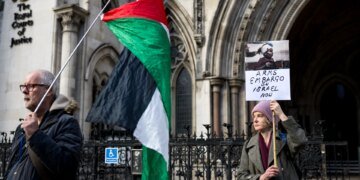Brussels/Reuters: European Union leaders formally agreed a Brexit deal at a Brussels summit on Sunday, urging Britons to back Prime Minister Theresa May’s package, which faces furious opposition in the British parliament.
The 27 leaders took barely half an hour to rubber-stamp a 600-page treaty setting terms for Britain’s withdrawal from the European Union on March 29 and a 26-page declaration outlining a future free trading relationship. May joined them shortly afterwards for what will be a brief meeting to seal the accord.
“This is the deal,” European Union Chief Executive Jean-Claude Juncker told reporters, saying he believed May would get it through parliament and ruling out big new concessions.
“Now it’s time for everybody to take responsibility — everybody,” said Michel Barnier, the Frenchman who has ground out the withdrawal treaty over the past 18 months.
Juncker called it “a sad day”, saying Brexit was a “tragedy” and tough on both sides.
“I believe the British government will succeed in securing the backing of the British parliament,” Juncker said, declining to comment on what might happen if May fails.
“I would vote in favor of this deal because this is the best deal possible for Britain,” he added. “This is the deal. It is the best deal possible and the European Union will not change its fundamental position when it comes to this issue.”
Barnier described the 600-page treaty setting terms for Britain’s withdrawal from the European Union on March 29 as a good base to negotiate a future relationship, a 26-page outline of which the leaders will also agree with May. But he insisted: “We will remain allies, partners and friends.”
French President Emmanuel Macron said the Brexit vote showed Europe needed reform. He stressed that Paris would hold Britain to tight EU regulations, notably on the environment, in return for giving it easy trade access.
The departure of a nation long skeptical of deeper EU integration was, Macron said, neither a moment for celebration nor mourning, but Britons’ free choice.
Dutch Prime Minister Mark Rutte, whose country is one of Britain’s closest trading partners, praised May’s handling of the difficult negotiations and said he was confident that she could see the deal through parliament in the coming weeks.
But he also had a warning for those in May’s Conservative party as well as the Labour opposition who argue that a better deal can still be done before Britain leaves in four months if lawmakers deny her minority government support on Brexit.
Lithuanian President Dalia Grybauskaite said there were at least four possible outcomes if parliament blocks the package. She named three – that Britons would hold a second referendum, hold a new election to replace May or return to Brussels to try and renegotiate the package. A fourth is that Britain will simply crash out of the bloc on March 29 without legal clarity.
Both sides have been making preparations for such a “no deal” scenario, though the EU insists Britain has more to lose. The pound has strengthened since the deal came together over the past 10 days, but companies and investors remain nervous.
Summit chair Donald Tusk said “no one will have reasons to be happy” when Brexit is concluded but quoted British rock star Freddie Mercury of Queen, who died 27 years ago on Saturday, to say: “Friends will be friends right till the end.”
The 27 EU national leaders will gather for an hour or so to formally endorse the package, which foresees little changing during a transition period lasting another two to four years.
They will then meet May briefly as she seeks momentum to get the package through the British parliament in the coming weeks.







 United Arab Emirates Dirham Exchange Rate
United Arab Emirates Dirham Exchange Rate

